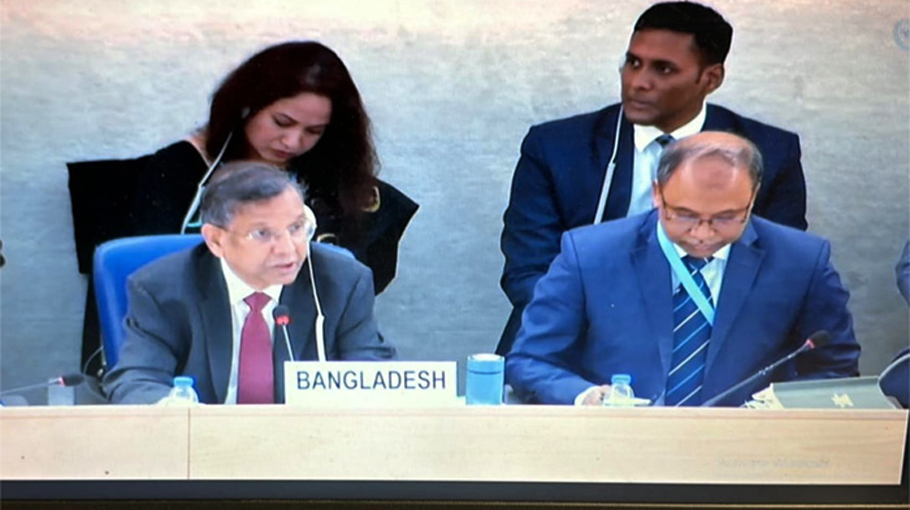BNP’s demand for caretaker govt unconstitutional
Anisul tells UN Human Rights Council

Law Minister AnisulHuq on Monday conveyed to the UN Human Rights Council that the opposition party BNP’s demand for holding the next national election under a caretaker government is “completely unconstitutional and illegal.”
Mentioning Bangladesh’s independent Election Commission, he said the government is committed to hold the next national election in a “free, fair and peaceful” manner with the participation of people.
Taking part at the United Nations Human Rights Council’s Universal Periodic Review (UPR) in Geneva, the law minister highlighted BNP’s violence and destruction on October 28 and 29, 2023.
Apart from brutally beating one policeman to death, BNP men attacked the residences of the chief justice and other judges, and torched police outposts, he said.
He said the policeman was beaten to death in broad daylight, and noted that there has been no arbitrary arrest but the law enforcement agencies went by the law of the land.
The law minister is leading the Bangladesh delegation at the review meeting that began at 3 pm Moday (Bangladesh Time).
Foreign Secretary Masud Bin Momen and Permanent Representative of Bangladesh to the UN Offices in Geneva, Mohammad Sufiur Rahman, among others took part in the meeting.
Briefing reporters virtually, the law minister said a total of 111 countries joined the meeting and 90 percent of the countries appreciated Bangladesh’s progress on the human rights front.
He said even countries like the United States, the UK and Canada did not criticise Bangladesh in a major way, rather they came up with some constructive recommendations.
The law minister said he responded to all the questions on rights issues including regarding those on the next national election.
Asked whether any country raised the issue of political dialogue ahead of the election, he said the dialogue issue was not mentioned.
The law minister said they will know how many recommendations Bangladesh received the day after tomorrow. Bangladesh will let the UN Human Rights Council know by February which recommendations it is willing to accept.
Joining the media briefing from the Ministry of Foreign Affairs, State Minister for Foreign Affairs MdShahriarAlam said they tried to enhance engagement with all the stakeholders before the UPR.
"You have watched and heard it today. And you realised that UPR is a beautiful process that brings every country on the same level playing field," he told reporters.
The state minister said their aim is to see Bangladesh in a better position tomorrow compared to what they have seen yesterday. "That's the spirit. We utilised our past experiences."
The law minister in his remarks at the review meeting said the government maintains a zero-tolerance policy against any human rights violation and highlighted the political space given to the opposition parties.
He also talked about the Rohingya crisis, noting that Bangladesh alone cannot resolve the crisis imposed by Myanmar.
The law minister also highlighted the continued political stability and significant economic development in Bangladesh.
Delimitation of Constituencies Act-2021, the Chief Election Commissioner and Election Commissioners Appointment Act-2022 and Parliament Election (Electronic Voting Machine) Rules-2018 were enacted and Conduct Rules for Political Parties and Candidates-2008 and Election Conduct Rules-2008 were amended since 2018 to make elections more fair, inclusive and credible, said the law minister.
The Chief Election Commissioner and Election Commissioners Appointment Act-2022 ensures an impartial and capable EC and is the first ever law of this kind in the country as well as in the subcontinent, he said.
Bangladesh’s first, second and third UPRs took place in February 2009, April 2013, and May 2018, respectively.
In its submitted national report, Bangladesh said it would continue to strengthen its institutions and measures to promote and protect human rights.
The UPR working group comprises the 47 member states of the Human Rights Council. However, each of the 193 UN member states can participate in a country review.
The documents on which the reviews were based are:
1) National report – information provided by the state under review
2) Information contained in the reports of independent human rights experts and groups, known as the Special Procedures, human rights treaty bodies, and other UN entities
3) Information provided by other stakeholders including national human rights institutions, regional organizations, and civil society groups, according to the UN Human Rights Council.
The UPR is a peer review of the human rights records of all 193 UN member states. Since its first meeting was held in April 2008, all 193 UN member states have been reviewed thrice.
Established in March 2006 by the UN General Assembly in resolution 60/251, the Universal Periodic Review (UPR) is designed to prompt, support, and expand the promotion and protection of human rights in every country.




